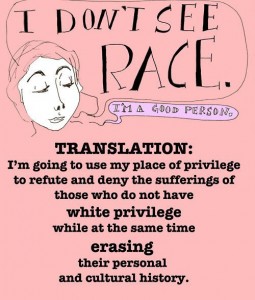(1) Don’t silence voices from people of color
Chances are, if you’re privileged, you cannot adequately locate oppression. Therefore, you must amplify the voices of silenced populations to incorporate diversity into your framework. Silencing voices from marginalized populations who have a problem with your particular movement or campaign indicates that you are uncomfortable with critique; therefore, you want to protect privilege. An activist, or an agent for social change, possesses the ability to be self-reflexive. Self-reflexivity means that you must consistently challenge and question yourself and/or your tactics. Don’t be hostile towards people who deal with structural violence on a daily basis and seek to point out violence in your campaign. Don’t be afraid of change.
(2) If a campaign focuses only on ONE oppression at a time, be cautious!
As Audre Lorde said, “There is no such thing as a single-issue struggle because we do not live single-issue lives.” Therefore, if your particular campaign to bring about vegan awareness ONLY focuses on diet or ONLY focuses on non-human animal abuse while excluding discussions about structural oppressions, like racism or sexism, then you are ignoring the framework that surrounds people of color, women, as well as non-human animals. Essentially, you’re adding to the violence by not making these connections.
(3) The “Sex Sells” script refers to white supremacist, able-bodied representations of sex
From decades of socialization, most of us know that people use the “sex sells” script to silence critical questions and critiques of sexist campaigns that seek to bring awareness to “ethical” issues. Let’s face it—not all sex sells. In fact, we argue that sex ISN’T selling, but a distorted representation of sex is. This type of representation privileges a heterosexist, white supremacist idea of what a woman’s body should be and look like. Sexist campaigns featuring women’s sexualized bodies are constructed to cater to one particular population—namely white heterosexual men. Therefore, even if the women who are participating are lesbian, or bisexual, the “representation” of their sexuality is tailored to the heterosexual framework.
Also, using “sex” to sell a particular idea or organization overtly excludes women of color from participating. Women of color, namely African American women, have a problematic relationship with their representation of sexuality in mainstream white America. African American women, in slavery, were used as breeders to produce more “strong” black laborers. Therefore, black women’s introduction to America was through institutionalized rape. This has had a negative lasting effect on our culture’s perception of black women’s sexuality. Therefore, black women are either desexualized (mammy figure) or are hyper-sexualized (jezebel). In fact, women of color are actually paid LESS than white women in sex work spaces, so saying “sex sells” demonstrates that you have not done your research.
(4) Being Vegan should NOT just mean caring for non-human animals. Part of the project is understanding oppression as a whole.
Refer to #2 for this. People don’t harm animals JUST because they like hurting them. Humans undergo years of socialization to subjugate marginalized populations. Remember, this is about power. Non-human animal abuse is linked to human abuse. Please, understand intersectionality.
(5) Only caring for “fuzzy cute” non-human animals indicates that you are privileging the lives of particular populations over others for aesthetic reasons.
Remember, you can’t pick and choose what types of non-human animals you want to bring awareness to. Unfortunately, cute fuzzy animals, like cats and dogs are prioritized because of arbitrary aesthetic reasons. This logic actually reproduces violence towards other populations. Imagine if we only wanted to bring rights to white women, and no other minorities. What type of justice would we be seeking? We need a more intersectional approach. Only caring for certain animals actually strengthens our culture’s arbitrary designation of consuming certain non-human animals like cows, or chickens. This makes no sense.
(6) Having a white framework and using a few minorities to look authentically diverse will reproduce racism.
All too often, diversity discourse is used as an uncritical way to satisfy our culture’s desire to see minorities in predominately white-dominated fields without changing the actual white framework. Recognize that “diversity” as we know it can reproduce racism. For example, let’s say you have a very white organization and you’re accused of not being diverse. Then, let’s say you hire two people of color. This is called “tokenizing” minorities. We see the “token minority” representation in almost every mainstream film where the cast is all white and there is just one Asian person or one or a few African American people.
We argue that this is problematic. Diversity shouldn’t just be a skin-color issue. Therefore, showcasing minorities won’t necessarily make your organization “diverse.” Diversity should begin in the framework, at the beginning of the process, not at the end.
(7) If your organization is accused of using “white” tactics, please know that we don’t necessarily just mean “white skin.”
When I say “white” I am merely trying to say “white supremacy.” Whiteness is an undefined framework that privileges certain knowledge’s, histories, and bodies, and largely operates on invisibility. Whiteness serves as a symbolic marker of normativity and power. Unfortunately, we live in a patriarchal white-supremacist culture, meaning that everything associated with Europe and whiteness is seen as “important” and “necessary.” Therefore, all other knowledge’s are devalued or excluded. Here’s a great interview with Binyavaga Wainaina about challenging the distorted view we have of Africa.
Using “white” tactics means that you are “individualizing” oppression, and you are not making intersectional connections to other oppressions. Oftentimes, single-issue campaigns are a product of this, where an organization focuses on one oppression without focusing on others, and through this, they inadvertently create more violence. As a black woman, I know that my social experience is framed by race, gender and class; however, since “whiteness” is not viewed as a “racial” group, a white woman might just focus on gender, not realizing how she is privileged by her whiteness, and therefore, ignores issues of race.
(8) Postracism IS Racism!
Post-racism means that issues relating to race no longer exist–they have been resolved. This, therefore, means that all people are on an equal playing field where hard work will result in mobility. Essentially, people who subscribe to post-race logic assume that racism is over because we have a black president. Most people who subscribe to post-race thought say, “ I don’t see race—I’m colorblind.” We’ve been trained to think this logic is progressive; however, remember—if you don’t see race, then that means you don’t see racism. If we were “post-race” then that would mean that diversity programs wouldn’t be needed in the first place. Post-race logic is actually racist. Subscribing to this logic means that we can still discriminate and exclude minorities while claiming that we “don’t see” race to justify our racism.
Remember, not all bodies are interpreted as equal. Different raced bodies have different connotations. We are aware that race, in humans, is not necessarily biological; however, people are racist because of the cultural connation’s associated with physical difference. You cannot use different raced bodies in the same way because they will be consumed differently by mainstream audiences. Refer to #3. Therefore, the “sex sells” script is inherently post-race. There is no mention as to what TYPE of sex or representation of sex will be advertised, it’s implied that “everyone” has an equal chance of representation, which isn’t true. The fact that it’s not called, “white sex sells” is an example of post-racism.
(9) + (10): If you are confused about whiteness, or if you feel that your writing or organization fails to incorporate intersectionality, just ask!
Don’t be afraid to ask questions. In fact, part of this project is learning to be self-reflexive. Oftentimes, your questions will reveal your own personal ideologies, so that’s a good starting point for critique. You won’t be able to locate your own privilege without the help of those who occupy marginalized positions, so it’s necessary that you hear our voices.
Written by Aph Ko


